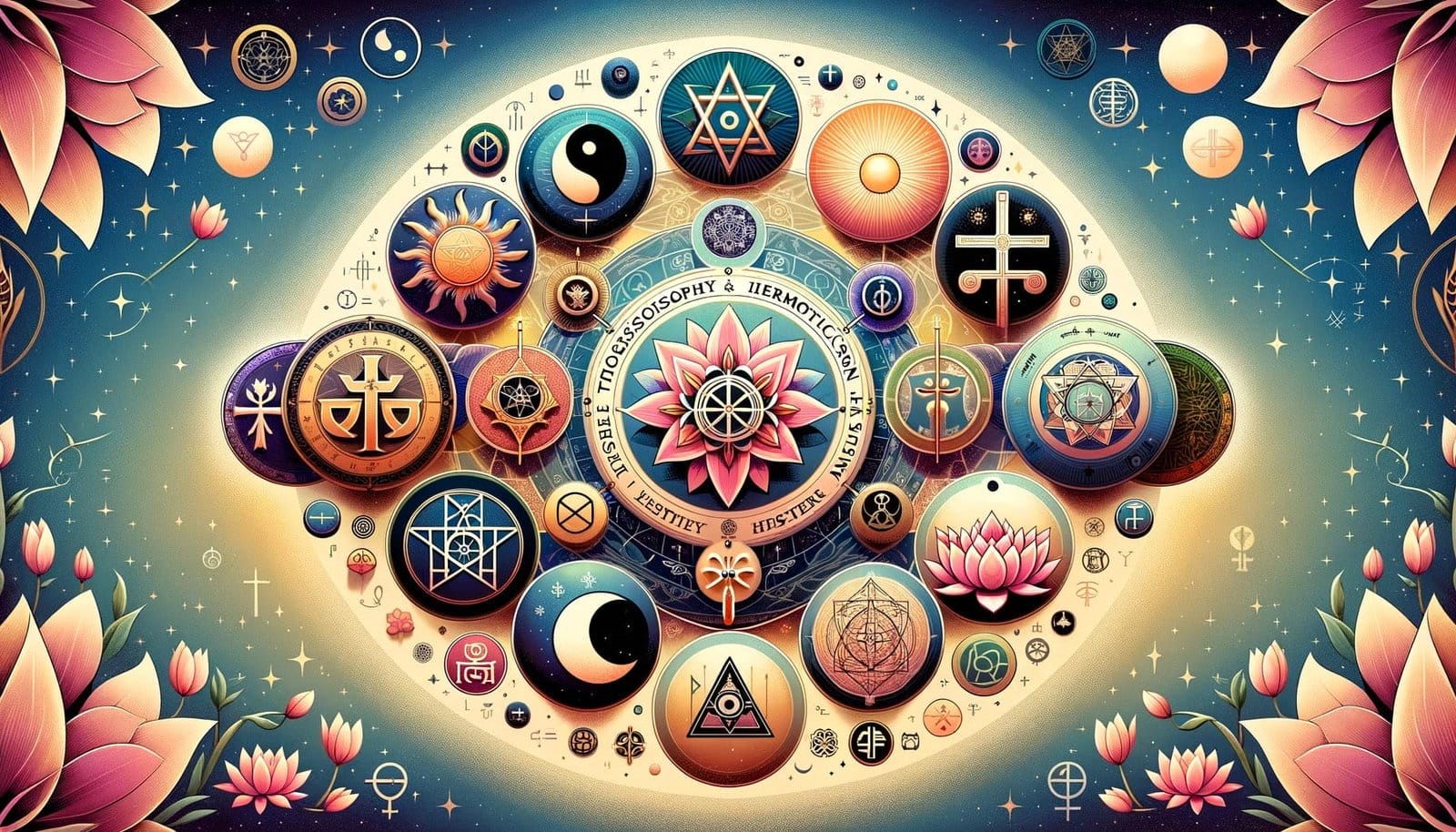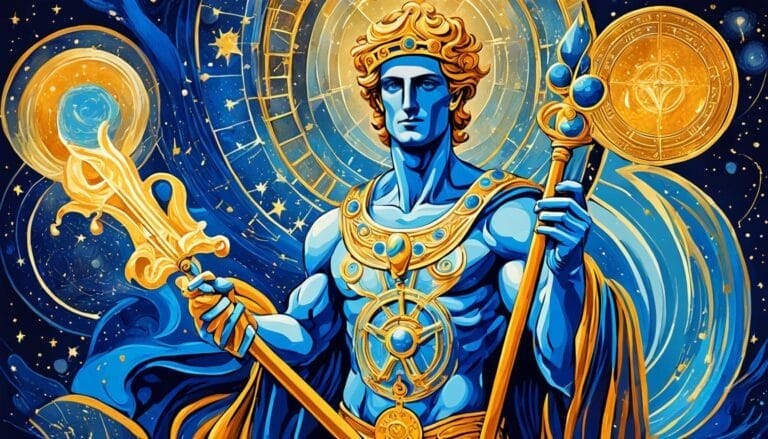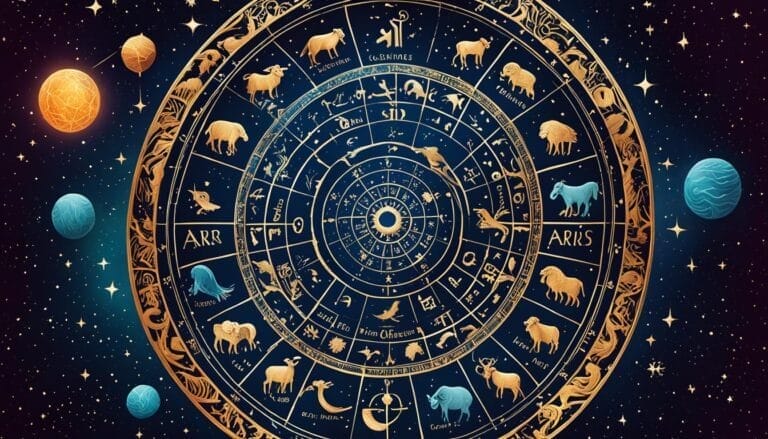An Introduction to Esoteric Knowledge and Traditions
Esoteric knowledge, akin to hidden streams of wisdom, flows subtly beneath the surface of the world’s major religions and philosophies. These esoteric traditions serve as secret gardens of understanding, where seekers delve into the profound mysteries of life and the cosmos.
This article aims to shed light on these hidden paths by comparing various esoteric or spiritual traditions. From Astrosophy‘s celestial insights to Theosophy‘s ancient wisdom, Hermeticism’s alchemical keys, Anthroposophy’s practical spirituality, Rosicrucianism’s mystical quests, and the profound depths of Eastern philosophies, we will look at what binds these traditions together and what sets them apart.
So, come along as we begin our journey into the heart of esoteric teachings, examining the threads that weave together the vast tapestry of spiritual science.
Key Points to Remember
- Different but Related: All these special teachings like Theosophy, Anthroposophy, Rosicrucianism, Hermeticism, and Eastern Philosophies might look different, but they have a common goal: to deeply understand life and how everything is connected.
- Influencing Our World: These traditions have shaped a lot of things around us, like art, books, thinking ways, and even science. They’ve been important in different times and places.
- Useful in Everyday Life: Some ideas from these teachings are used in real life, like Waldorf schools from Anthroposophy, and meditation from Eastern Philosophies.
- Sharing Ideas: These traditions often share ideas with each other. For example, Anthroposophy grew out of Theosophy and has things in common with Hermeticism and Rosicrucianism. Also, Eastern and Western spiritual ideas often mix.
- Still Important Today: These old traditions are still helpful and changing even now. They give us new ways to see ourselves and the world, helping us grow and understand life better.
- Helping Us Grow: Learning about these traditions can help us grow personally and understand others better. They teach us to think about big questions and learn more about life.
Understanding Esoteric Knowledge and Traditions
The term ‘esoteric’ might sound mysterious, and that’s because it is. It comes from the Greek word ‘esoterikos’, meaning ‘inner’.
Esoteric traditions are concerned with the inner workings of the soul and the hidden aspects of the universe.
They often involve teachings that are meant for a select few—those ready to look beyond the obvious and question the deeper aspects of existence.
While esoteric traditions might seem secretive, they share a common goal: to seek understanding beyond the physical world. They encourage us to look within and find connections to the broader cosmos. These paths teach that true knowledge comes from within and that by unlocking our inner potential, we can discover the divine nature that connects us all.
Despite their mystique, esoteric traditions are not about turning away from the world. Instead, they offer tools to live more fully within it. By understanding the spiritual laws that govern the universe, adherents believe they can lead more harmonious lives. Whether it’s through meditation, studying sacred texts, or observing the stars, these traditions provide a rich soil for growing a deeper sense of self and a clearer view of one’s place in the grand scheme of things.
Astrosophy: A Cosmic Perspective
Astrosophy, or ‘star wisdom,’ views the cosmos as an organism teeming with meaning and purpose. Originated by Rudolf Steiner and expanded by Willi Sucher within Anthroposophy, astrosophy perceives celestial movements as symbolic of deeper spiritual truths. It aims to decode the cosmic patterns to grasp human destiny and the evolution of consciousness.

Astrosophy vs. Traditional Astrology
In contrast to traditional astrology’s focus on predicting events, astrosophy sees stars as guides, not fate determiners. It encourages understanding how cosmic rhythms affect our spiritual and physical existence. Astrosophy offers insights into personal growth by interpreting the planetary positions at birth, helping individuals align with the universe’s patterns.
The Interconnectedness of Earth and Humanity
Astrosophy introduces the concept of Earth’s and humanity’s simultaneous evolution, suggesting a dynamic interplay between humans and celestial beings. This notion fosters an active engagement in one’s spiritual journey, using the cosmos’s wisdom as a guiding light.
Fostering a Personal Connection with the Cosmos
Astrosophy emphasizes a contemplative engagement with the night sky, encouraging individuals to view it as a spiritual map rather than just a visual spectacle. This approach broadens the mind and nurtures the soul, offering guidance through life’s challenges and opportunities.
Astrosophy and Theosophy: Shared Pursuits
Astrosophy shares with Theosophy a commitment to unveiling spiritual truths and understanding the universe’s unseen aspects. However, it uniquely focuses on the spiritual significance of astronomical phenomena, offering a distinct view of the macrocosm’s reflection in the individual’s microcosm.
Astrosophy’s Role in Personal and Cosmic Understanding
For those seeking deeper cosmic understanding, astrosophy provides a spiritually rich exploration of the stars. It transcends basic astrological interpretations, aiming to elevate the spirit and harmonize life with celestial rhythms. Astrosophy thus serves as a celestial guide in the quest for self-realization and a deeper connection with the universe.
Theosophy – The Beacon of Ancient Wisdom
Theosophy emerges as a beacon of ancient wisdom, rekindled for the contemporary seeker. Rooted in the late 19th century under the guidance of Helena Blavatsky, it offers a path to ‘Divine Wisdom’ that pervades the universe. This wisdom, Theosophy suggests, is accessible to those willing to explore beyond the physical realm.
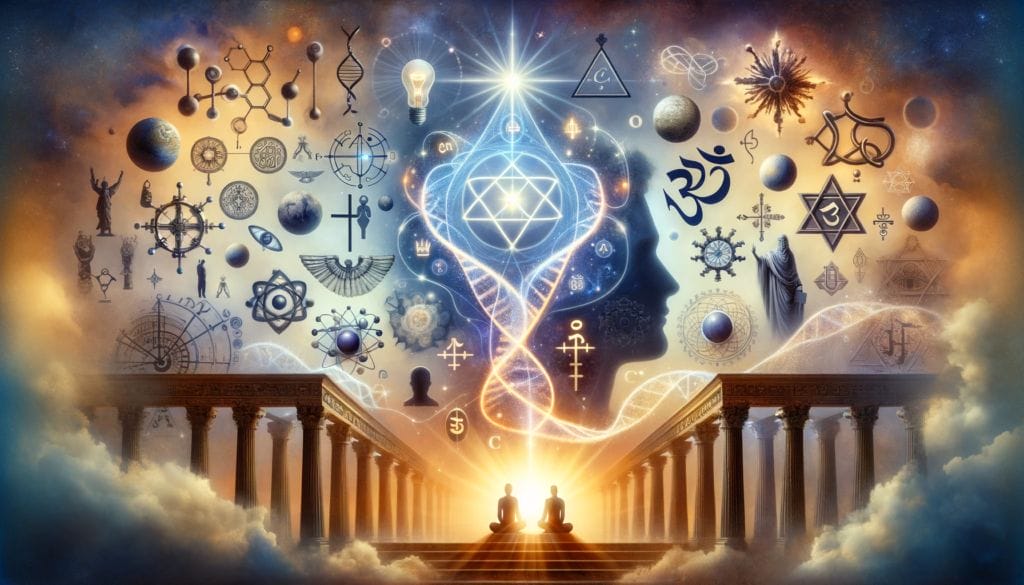
A Synthesis of Spiritual Traditions
Theosophy draws from diverse teachings across various cultures and historical periods, highlighting a common thread of insight woven through each spiritual path. It distinguishes itself as a philosophy, not a religion, transcending religious dogma to advocate for universal brotherhood across all divisions of race, creed, or color.
Fundamental Propositions of Theosophy
Central to Theosophical thought are three fundamental propositions. These include the existence of an omnipresent, eternal reality beyond human comprehension; the cyclical nature of the universe marked by periods of activity and rest; and the law of karma, which dictates the cycle of reincarnation and the soul’s evolution through the consequences of past actions.
Transformation Through Spiritual Engagement
Theosophy is about more than just acquiring knowledge; it’s about a transformation that stems from deep spiritual engagement. It invites students to ponder the mysteries of existence, the unseen forces shaping life, and the expansion of human consciousness towards enlightenment.
Contemporary Relevance and Impact
Theosophy’s influence in modern spirituality is significant, having infused ancient wisdom into contemporary thought and culture. It bridges spirituality with science, enriching dialogues and perspectives in both realms.
A Path to Growth and Understanding
For newcomers, Theosophy represents a journey towards personal growth and understanding. It fosters a sense of community among seekers and encourages a deep exploration of life’s purpose. Through Theosophy, many find not just answers to profound questions, but also a renewed sense of wonder and a motivation to positively impact the world.
Hermeticism
Hermeticism is an ancient philosophical and religious system named after Hermes Trismegistus, a figure synonymous with esoteric wisdom. It is grounded in the Hermetica texts and delves into the divine, the natural world, and humanity’s spiritual place within the cosmos.
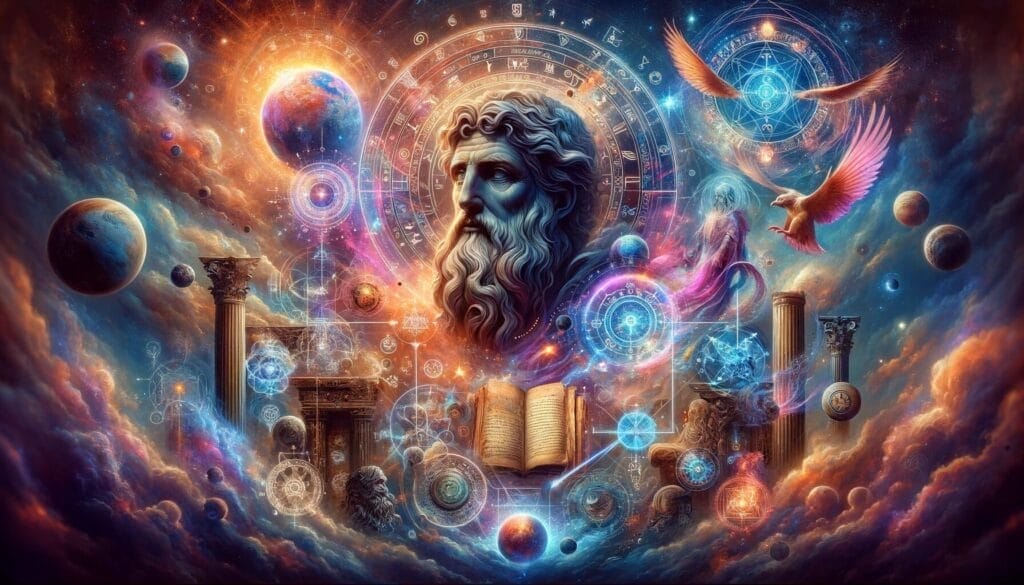
Principles and Beliefs in Hermeticism
Central to Hermeticism is the idea that the universe operates on principles accessible through spiritual alchemy, the transformation of the soul. It teaches the interconnectedness of all existence, summarized by the axiom “As above, so below.” This concept reflects the belief that celestial dynamics are mirrored in the human experience.
Practices and Goals of Hermeticism
Hermeticism focuses on personal revelation and gnosis – direct knowledge of the divine. Practitioners engage in meditation, rituals, and study sacred texts to understand universal laws and achieve enlightenment. This journey toward enlightenment is seen as a path to realizing one’s potential and reuniting with the divine source.
Hermeticism and Spiritual Ascent
While sharing the goal of spiritual ascent with Theosophy, Hermeticism emphasizes personal mystical experiences for achieving this goal. Its emphasis on inner transformation guides individuals to discover their divine spark and align their lives with cosmic harmony.
The Contemporary Relevance of Hermeticism
In today’s world, Hermeticism offers wisdom that connects seekers with the spiritual realm. It encourages a rediscovery of the sacred and understanding the deep bond between humanity and the universe. Its teachings are a source of deeper comprehension of life’s mysteries and a path to a more aware and fulfilling life.
Hermeticism’s Role in Spiritual Science
For those interested in the esoteric, Hermeticism is a significant stream in the broad river of spiritual science. It invites individuals to awaken to their inner wisdom and align with the universal principles governing existence.
Anthroposophy
Anthroposophy, created by Rudolf Steiner in the early 20th century, is a spiritual philosophy known as “human wisdom.” This approach encourages the cultivation of one’s spiritual nature through disciplined inner work and active engagement in the world. It emphasizes the harmonious development of intellectual, artistic, and practical skills, enhancing the full spectrum of human abilities.
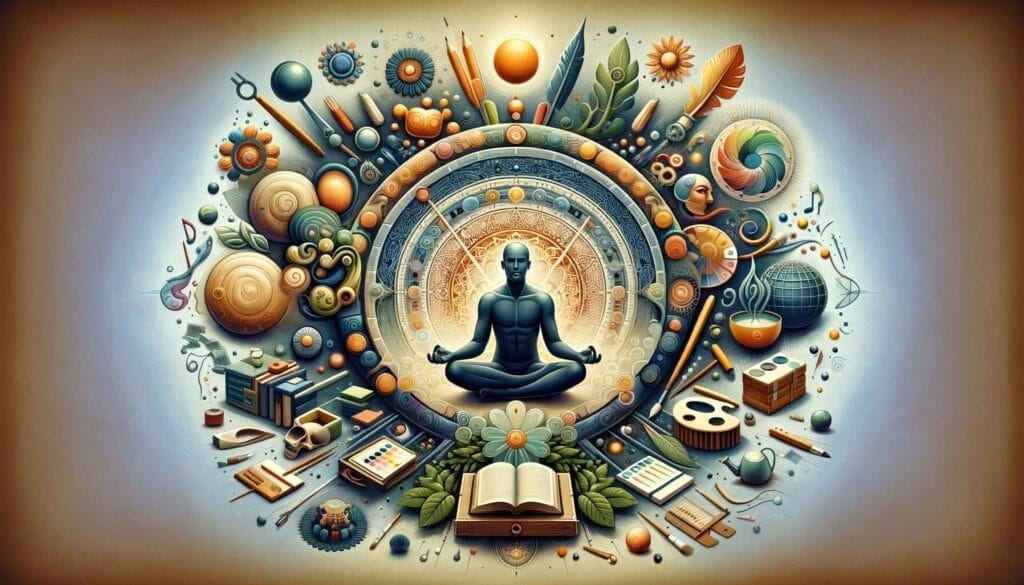
Practical Applications in Daily Life
Central to Anthroposophy is its practical application in everyday life. This philosophy has led to the creation of initiatives like Waldorf education, which focuses on fostering the imaginative and creative abilities of children, and biodynamic agriculture, which treats farms as living entities and aligns farming practices with the rhythms of the planets. Anthroposophy’s influence extends to the arts, medicine, and social structures, integrating spiritual consciousness into various aspects of life.
Distinct Features and Modern Relevance
While sharing similarities with Theosophy in its pursuit of spiritual understanding, Anthroposophy carves its distinct path with a focus on freedom, creativity, and personal spiritual evolution.
It uniquely highlights the role of Christ in human and spiritual development, differing from Theosophy’s more syncretic nature.
Today, Anthroposophy’s impact is global, significantly influencing education, the arts, social reform, and ecological practices. It appeals to those seeking a spiritually active and creative lifestyle, promoting a deep connection with the spiritual realm.
A Path for Newcomers
For those new to its concepts, Anthroposophy offers a practical yet deeply spiritual journey. It presents a vision of human potential that enriches the world through increased awareness and responsible engagement.
Anthroposophy invites us to realize our role as active participants in a dynamic, evolving universe, awakening our full potential as spiritual beings.
Rosicrucianism
Rosicrucianism stands as a historical enigma, born in the early 17th century through manifestos advocating a universal reformation of humankind. This mystical tradition, intertwined with esoteric Christianity, alchemy, and philosophical mysticism, represents a community of scholars dedicated to elevating human understanding and spiritual awareness.

Core Teachings and Practices
The multifaceted teachings of Rosicrucianism include mystical interpretations of Scripture, harnessing spiritual forces, and seeking enlightenment akin to alchemical transformation.
Its rich symbolism, rituals, and doctrines guide seekers through stages of initiation, revealing deeper truths about the self and the universe. Central to its philosophy is the transformation of the soul, considered essential for unlocking divine mysteries and achieving higher self-union.
Focus on Western Esoteric Tradition
While sharing Theosophy’s pursuit of hidden knowledge, Rosicrucianism distinctively emphasizes Western esoteric traditions. It weaves Hermeticism, Kabbalah, and Gnostic teachings into a unique tapestry of spiritual wisdom, focusing on the individual’s inner transformation through mystical experiences and the application of universal laws.
Rosicrucianism in Modern Times
Today, various organizations perpetuate Rosicrucian philosophy, offering profound insights and paths to spiritual mastery. Rosicrucianism continues to appeal to modern seekers, resonating as a testament to humanity’s perennial quest for deeper understanding and living out higher principles.
Rosicrucianism’s Unique Appeal
Rosicrucianism offers a singular perspective within the landscape of spiritual science. Its historical roots and ceremonial richness attract those intrigued by the mysteries symbolized by the rose and the cross, emblematic of the soul’s unfolding potential and the intertwining of material and spiritual paths.
Eastern Philosophies
Eastern philosophies, encompassing a vast array of spiritual traditions from regions like India, China, and Japan, hold a reservoir of wisdom on the nature of existence and the path to enlightenment.
These philosophies, including Hinduism, Buddhism, and Taoism, often emphasize personal experience and inner transformation as the means to achieve a harmonious life and spiritual liberation.
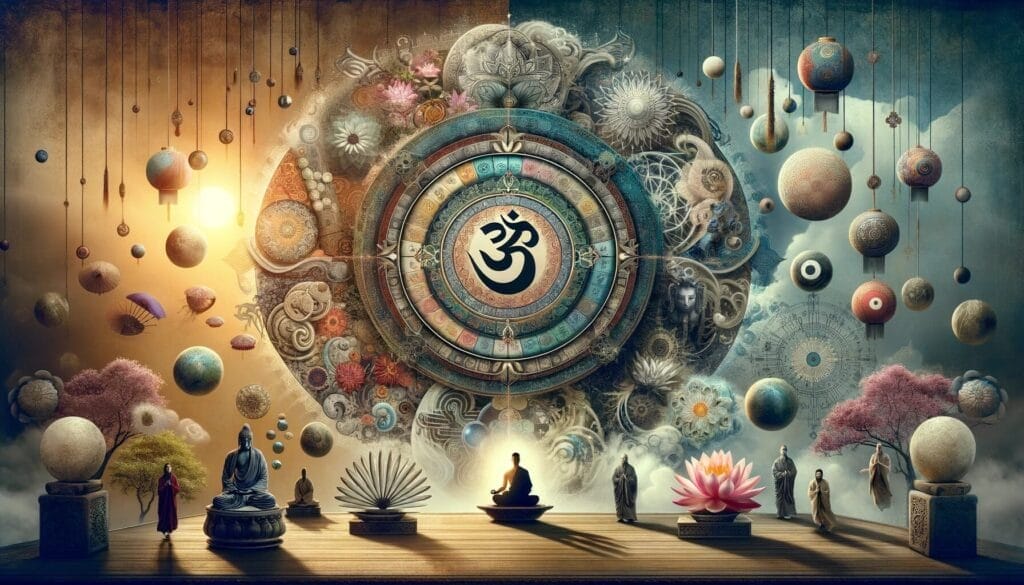
Hinduism, with its rich tapestry of deities and teachings like karma and dharma, provides a comprehensive framework for understanding the cycles of birth, life, and rebirth, and the pursuit of ultimate truth or Brahman.
Buddhism, founded on the teachings of Siddhartha Gautama, the Buddha, offers the Four Noble Truths and the Eightfold Path as a guide to overcoming suffering and attaining Nirvana. Taoism focuses on living in harmony with the Tao, the fundamental principle that is the source of everything in the universe.
Eastern philosophies often share Theosophy’s view of the interconnectedness of all life and the existence of a higher, unifying truth. However, they distinguish themselves with practices and concepts deeply rooted in their cultural contexts, like meditation, the concept of chi, and non-attachment. These traditions encourage living with mindfulness, compassion, and in alignment with the natural flow of life’s energies.
For those seeking a path steeped in ancient wisdom, Eastern philosophies offer profound insights and practical teachings that resonate with many core tenets of spiritual science. They provide valuable perspectives on living a balanced life, nurturing the spirit, and understanding the intricate dance of the cosmos.
Common Grounds and Distinguishing Features
This table provides a brief overview of each tradition’s focus, unique features, spiritual practices, and cultural context, offering a comparative glance at these rich and diverse paths.
| Tradition | Key Focus | Unique Features | Spiritual Practices | Cultural Context |
|---|---|---|---|---|
| Theosophy | Synthesis of science, religion, philosophy | Universal brotherhood, comparative study of religions | Meditation, study of sacred texts | Western, with Eastern influences |
| Anthroposophy | Application of spiritual insights in daily life | Waldorf education, biodynamic farming | Eurythmy, meditation, artistic activities | Based on Western esotericism |
| Rosicrucianism | Mystical interpretation of Christianity, alchemy | Secret knowledge, initiation rituals | Alchemical practices, study of symbolism | Western, Christian mysticism |
| Hermeticism | Alchemical spiritual transformation | “As above, so below”, Hermetic principles | Alchemy, astrology, meditation | Ancient Egyptian and Greek origins |
| Eastern Philosophies (e.g., Buddhism, Taoism) | Personal experience, inner transformation | Meditation, non-attachment (Buddhism); harmony with Tao (Taoism) | Meditation, mindfulness, martial arts (Taoism) | Eastern, Asian origins |
Shared Quest for Deeper Meaning
Exploring various esoteric traditions, including Theosophy, Anthroposophy, Rosicrucianism, and Eastern philosophies, reveals a shared quest to understand life’s deeper meaning and to attain spiritual enlightenment. These diverse paths converge in their pursuit of spiritual knowledge, each offering insights into the profound mysteries of existence.
Emphasis on Inner Transformation
A key commonality among these traditions is their focus on personal spiritual growth. From the meditative practices in Eastern philosophies to the mystical rituals in Rosicrucianism and the self-development methods in Anthroposophy, each path encourages a deep inner journey. This transformative process is seen as essential for reaching a state of enlightenment and understanding the interconnectedness of all beings.
Unique Features of Each Tradition
While sharing similar goals, each tradition also possesses distinct characteristics. Theosophy blends various religious teachings, emphasizing a universal brotherhood. Anthroposophy extends its spiritual insights into practical areas like education and farming. Hermeticism delves into alchemical transformations, and Eastern philosophies, including Buddhism and Taoism, offer unique meditation techniques and philosophical concepts rooted in their cultural heritage.
Varied Pathways to Spiritual Understanding
These esoteric traditions offer a rich tapestry of approaches for those seeking to connect with spiritual life. They invite us to look beyond the physical realm, to uncover the profound relationship between ourselves and the cosmos, and to find balance and harmony in the complex web of existence. Each path provides a unique lens through which to view and understand the spiritual dimensions of life.
Impact on Society and Culture
The Broad Influence of Esoteric Traditions
Esoteric traditions have profoundly and extensively influenced society and culture. They have shaped individual beliefs and practices and left a significant imprint on art, literature, philosophy, and even scientific thinking.
Theosophy’s Cultural and Social Contributions
Theosophy, merging science, religion, and philosophy, has sparked numerous cultural movements and influenced notable personalities in arts and sciences. Its focus on universal brotherhood has fueled social reform and humanitarian initiatives.
Anthroposophy’s Practical Applications
Anthroposophy, particularly through Waldorf education and biodynamic farming, has introduced innovative learning methods and sustainable agricultural practices, impacting communities globally.
Hermeticism’s Role in Western Thought
Hermeticism, with its mystical and alchemical teachings, has profoundly influenced Western esoteric thought. It played a significant role during the Renaissance and in shaping modern occultism.
Rosicrucianism’s Mystical Influence
Rosicrucianism, blending mysticism with science, has contributed significantly to the development of Western mysticism and has influenced various secret societies and fraternal groups.
Eastern Philosophies and Their Western Impact
Eastern philosophies have deeply shaped the Western spiritual landscape, especially through practices like meditation and yoga. They have offered alternative views on health, wellness, and consciousness, spurring interest in holistic and integrative health approaches.
In conclusion, esoteric traditions have provided not only spiritual paths for personal transformation but have also left lasting impacts on societal values, artistic expressions, and intellectual endeavors, thereby enriching the cultural and conscious fabric of humanity.
Popularity & Crossover
| Tradition | Popularity | Crossover with Other Traditions |
|---|---|---|
| Theosophy | Moderately popular; influential in spiritual and New Age circles | Shares concepts with Anthroposophy; influenced modern esoteric groups |
| Anthroposophy | Relatively popular, especially in education and organic farming | Developed from Theosophy; shares ideas with Hermeticism and Rosicrucianism |
| Rosicrucianism | Niche popularity; known among esoteric scholars and practitioners | Influences and is influenced by Hermeticism; shares mystical elements with Theosophy |
| Hermeticism | Niche; significant historical influence, especially in Renaissance esotericism | Influences and is influenced by Rosicrucianism; shares alchemical and mystical concepts with Theosophy |
| Eastern Philosophies (e.g., Buddhism, Taoism) | Widely popular, especially for meditation and mindfulness practices | Influences and is influenced by Theosophy; shares concepts of spiritual development with Anthroposophy |
This table offers a general perspective, showing that while these traditions have their unique characteristics, there is significant crossover in their core concepts and philosophical outlooks.
Theosophy’s universal approach to spirituality has influenced many modern esoteric groups. Anthroposophy, while growing out of Theosophy, has established its niche particularly in education with Waldorf schools.
Rosicrucianism and Hermeticism share deep historical roots in Western mysticism and alchemy. Eastern philosophies have gained widespread popularity in the West for their meditation practices and have influenced the Western spiritual landscape significantly.
In Summary
In exploring these esoteric traditions, we find a rich and varied landscape of spiritual inquiry. Each tradition, with its unique teachings and practices, invites us into a deeper understanding of ourselves and the universe.
Theosophy, Anthroposophy, Hermeticism, Rosicrucianism, and Eastern philosophies, despite their differences, all share a common goal: the pursuit of higher knowledge and spiritual enlightenment.
These traditions challenge us to look beyond the material world, to explore the depths of our being, and to seek a harmonious connection with the cosmos. They encourage us to question, to reflect, and to grow, offering paths that are as diverse as the seekers who walk them.
As we reflect on the wisdom these traditions offer, we are reminded of the vast potential within each of us to transcend the ordinary, to discover the extraordinary, and to contribute to the collective evolution of humanity. Whether through the study of sacred texts, meditation, artistic creation, or practical application in our daily lives, these esoteric paths offer us tools to navigate life’s journey with greater awareness, compassion, and purpose.
In the end, these traditions invite us on a journey of the soul—a journey that is as personal as it is universal, as challenging as it is rewarding. They offer us a glimpse into the mysteries of existence and beckon us to continue our quest for truth and understanding.
